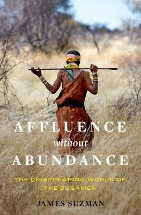Affluence without abundance: The disappearing world of the Bushmen by James Suzman

Bloomsbury, 2017. ISBN 9781632865724
(Age: Senior secondary - Adult) Non-fiction. Anthropologist James
Suzman has spent many years living and working with the Bushman
groups of Namibia and Botswana, southern Africa, providing us with a
unique insight into the culture of these hunting and gathering
people. He describes them as a group of people who had already
discovered the Keynesian economic ideal of a life of satisfied needs
without long working hours. He estimates that they may have spent
about 15 hours a week securing their nutritional needs. The idea of
working to cultivate extra food, or of storing for later, was
completely unknown and unnecessary to the Ju/'hoansi. The land
always provided for them in some way. The thought that the so-called
'primitive man' could actually have affluence without the endless
toil for further wealth is unimaginable to Western society caught in
the perpetual cycle of work and accumulation of things.
Suzman's book is fascinating. So many unusual concepts are revealed
to us: the idea of equality moderated by jealousy; of empathy with
animals but not humanised affection or compassion; a respectful and
sharing relationship with predator lions; the environment as a set
of relationships that includes everything even litter; satisfied
instincts without greed or obesity. Whilst reading, it seemed to me
that there may be some overlaps with the values of Australian
Aboriginal peoples. There are also some shared problems brought on
by loss of land to colonising powers.
There are many interesting characters, some of them revealed in a
wonderful collection of colour photographs. The book also includes
several maps of the region, an index, and a list of suggested
further reading.
Helen Eddy